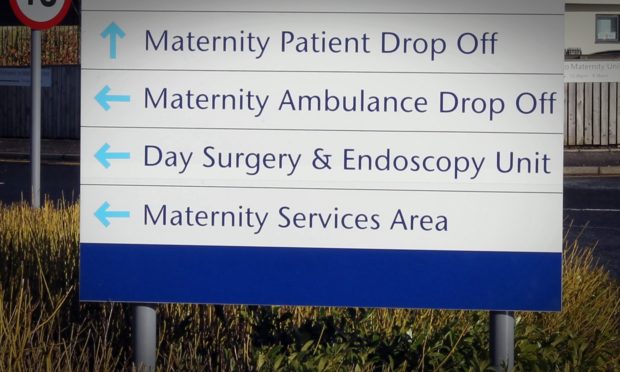Dundee has the highest rate of stillbirth in Scotland.
Figures released by the Office for National Statistics (ONS) show Dundee has the highest rate of perinatal mortality in the country and the fourth highest incidence rate in the UK.
Twelve in every 1,000 live births in Dundee were stillborn, or died within the first week of life in Dundee, double the Scottish average.
Doctors warn smoking as a major contributor to infant mortality, along with expectant mothers having a body mass index (BMI) greater than 35.
More than one in five women in Tayside booking antenatal appointments with the NHS admitted to smoking while pregnant, again the highest rate in the country.
A spokesperson for the health board said: “NHS Tayside closely monitors and reports on rates of stillbirth, neonatal and infant mortality. NHS Tayside also monitors other pregnancy outcomes including perinatal morbidity, maternal morbidity and maternal mortality.
“We are aware that in Tayside in 2016 there were 16 stillbirths recorded – a rate of 3.8 per 1000 births and this compares favourably to other maternity units in Scotland and is below the national average rate for stillbirth.
“Every perinatal loss and adverse event is reviewed and investigated as part of the NHS Tayside clinical governance process.
“In addition to comprehensive reviews of stillbirths and deaths that occur within the hospital setting, preventative work around stillbirth is embedded into our midwives’ and doctors’ everyday practice.”
Steps NHS Tayside take to reduce stillbirth and perinatal death:
- A full risk assessment for risk factors for stillbirth and placental disease at the first antenatal booking visit
- Screening tests in early and mid pregnancy to identify fetal abnormalities associated with perinatal loss and also to identify early warning signs of disordered placental development and function
- Regular measurement of the size of the baby and regular antenatal assessment of maternal well-being looking for signs of placental disease
- Using customised fetal growth charts to better identify babies at risk of adverse perinatal outcome
- Clinical practice is supported by safe and efficient Obstetric Ultrasound Department that is able to meet the demands of our pregnant population
- A full complement of labour ward midwives and doctors that are trained in the interpretation of fetal monitoring in labour
- All pregnant women in Tayside are informed of the risk of stillbirth as part of routine antenatal care. Pregnant women are also informed of the association between a reduction in fetal movements and stillbirth.
- All pregnant women receive written advice on the importance being aware of fetal movements and what steps should be taken if women notice a change of pattern or a reduction in fetal movements.
- Smoking is a risk factor for stillbirth and all pregnant women who smoke are offered referral to smoking cessation services to support them to stop smoking, including the ‘Give it up for baby’ programme.
The stillbirth and neonatal death charity SANDS said although the high mortality rate did not necessarily reflect poor standards of care, health boards could not afford to become complacent.
Janet Scott, a research lead for the group, said: “ONS data is not adjusted for factors that influence perinatal mortality such as social deprivation and ethnicity, so a high mortality rate in this table doesn’t necessarily mean poor care in that region.
“MBRRACE-UK data does adjust for risk factors and gives a better indication of the poorly performing areas.
“However nowhere can be complacent and all units should be looking at their outcomes and reviewing all baby deaths to identify avoidable poor care and make sure maternity service improvements and public health interventions are implemented.
“At Sands we know the profound impact on families when their baby dies: we work with the Scottish Government’s Stillbirth Working Group to devise and oversee national strategies to reduce deaths.”
NHS Tayside has said a formal investigation is always carried out as part of inquiries into any neonatal death.
A spokesperson said: “When a baby has died circumstances around the event and the care provided are reviewed in a multi-professional multidisciplinary meeting within a few days of the event. Further investigation, including a formal external review is subsequently requested if required.
“Women and families that have lost a baby are offered a number of investigations including a post-mortem examination of the baby by a specialist pathologist, in an attempt to identify the cause of their loss. It is important to ensure that we can provide the family with information and to ensure that the service learns from these tragic events.
“NHS Tayside has a dedicated bereavement counsellor and we are well supported by charities such as SANDS to provide education to all staff caring for families who have had a stillbirth or neonatal death.
“All women are offered an appointment with their consultant following stillbirth or neonatal death. Our dedicated bereavement midwife also supports families whose baby has died in the neonatal unit.”
Labour’s Anas Sarwar MSP said: “These are shameful figures that should lead to urgent action from the SNP.
“There are clearly issues to be addressed across the country – but Health Secretary Shona Robison should be taking a greater interest in these issues in her own backyard.
“We know that wealth inequality leads to health inequality and years of Tory and SNP austerity will have done nothing to reverse this in Dundee and across Scotland.”










